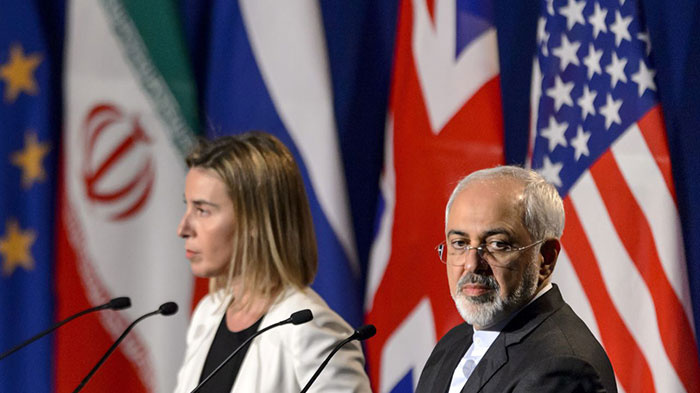What is Iran up to if extension of sanction are ratified into law?

On November 15, the US House of Representatives passed Foreign Affairs Committee Chairman Ed Royce’s bipartisan bill – H.R. 6297 – to provide a ten-year extension of the Iran Sanctions Act (ISA). In his supporting speech, Royce called on the Senate to “quickly take up this bill and send it to the President’s desk, keeping a critical tool in place for the next Administration while it reevaluates the dangerous track that U.S. policy toward Iran has been on”, the US House’s Foreign Affairs Committee web page reported.
Last Wednesday, Iranian Supreme Leader Ayatollah Ali Khamenei made Iran’s stance towards this move clear during a speech addressed to members of the volunteer Basij forces in Tehran. The Supreme Leader criticized the US over what he called the country’s history of violations in the less than a year since the implementation of JCPOA, the nuclear deal. “The most recent of them is the 10-year extension of the sanctions. If these sanctions are extended, it will surely constitute a violation of the JCPOA and they (the US) should know that the Islamic Republic will definitely react to it,” state-run English channel Press TV quoted him as saying.
On Tuesday, a number of Iranian officials also broke the news that Iran has prepared scenarios that will be adopted if the nuclear deal is breached. “Iran has made necessary preparations for potential US decisions about the extension of sanctions,” Ali-Akbar Salehi, the head of the Atomic Energy Organization of Iran (AEOI), told reporters on Monday. Salehi noted that Iran is ready to respond to any US breach of the JCPOA, saying Tehran will make necessary decisions at the appropriate time and after the assessment and analysis of Washington’s moves. He further said Iran’s Supreme Leader has already provided guidelines to Iranian officials about standing ready to considerably increase the country’s nuclear enrichment capacity. Washington will be the “main loser” if it fails to remain committed added Salehi, also a part of the team of nuclear negotiators.
Alaeddin Boroujerdi, chairman of the Iranian Parliament's Committee on National Security and Foreign Policy, was more specific about Iran’s retaliatory measures: “In case of the extension of sanctions and violation of the JCPOA, we will raise uranium production and enrichment to 190,000 SWU (separative work units),” he said. This is the enrichment capacity demanded by the Supreme Leader Ayatollah Khamenei in July 2018, at the height of nuclear talks between Iran and the six world powers.
“‘Initiating sanctions’ is no different from ‘renewing them after their expiration,’ and the latter is also [an instance of imposing] sanctions and violation of the previous commitments by the opposite side,” Ayatollah Khamenei had said in his meeting with members of the army naval force.
US president-elect Donald Trump has threatened during his campaign that US will step out of the deal as a number-one priority when he takes office. What Iran is fulminating against, however, does not immediately have anything to do with Trump’s presidency. In fact, the Senate will vote for the renewal of ISA before Trump goes to the Oval Office. Reuters has quoted Senate Republican Majority Leader Mitch McConnell on Wednesday, saying the senate will pass the bill and expect Obama to sign it into law.
According to Reuters, Obama administration officials deemed the reinstatement of the bill unnecessary, but raised no concerns that a renewal would violate the deal. Some Democrat Senators have also fired back at Iran saying the ISA is critical for congressional snapback sanctions should Iran violate the deal. Maryland senator Ben Cardin and New Jersey senator Bob Menendez are two Democrats that voted against the nuclear deal sealed last year.
Kaveh Afrasiabi, author of ‘Iran Nuclear Negotiations’, told Press TV that the ISA, conceived as a nuclear-related act, violates the UN Resolution 2231. The Senate seems to be paving the way for Donald Trump’s pledge during his presidential campaign that he would tear up the deal Afrasiabi said. In the meantime, John Brennan, the head of C.I.A., has told BBC that scrapping the nuclear deal would undermine American foreign policy, embolden hard-liners in Iran and threaten to set off an arms race in the Middle East by encouraging other countries to develop nuclear weapons. Brennan is to be succeeded by Mike Pompeo under the Trump administration. Republican Pompeo’s view on the JCPOA, inscribed onto his Tweeter account in mid-November: “I look forward to rolling back this disastrous deal with the world’s largest state sponsor of terrorism”.
The secretary of Iran’s Supreme National Security Council Ali Shamkhani commented on a more positive note, saying Iran is not concerned about the violation of the Joint Comprehensive Plan of Action because “the maneuvering power we have corresponding any negative action on undertaken by the opposite party is definitely deterrent power”.
Shamkhani’s confidence perhaps lies in Iran’s ties with other sides of the deal. As Parliament Speaker Ali Larijani has put it in a recent interview with Chinese Phoenix TV, Iran has close ties with Europe, Russia and China, which means the US will be alone in efforts to sabotage the deal.

